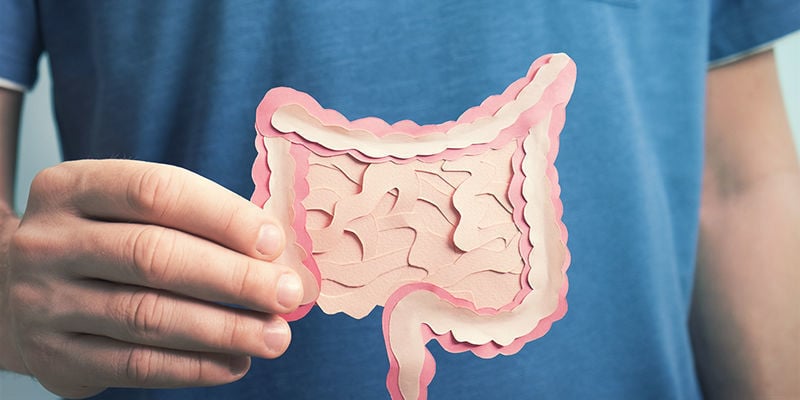
How Does Cannabis Affect The Digestive System?
Cannabis is known to affect individuals differently, and this is true of the herb’s impact on digestion. Most stoners are familiar with the “munchies”, but there’s much more to the relationship between weed and the digestive system than this. Here’s what you need to know about the potential positive and negative effects of cannabis on digestion.
There's no denying that the relationship between cannabis and the human body is a complex one. With interactions between cannabinoids and the endocannabinoid system being largely responsible for our responses, there's definitely a lot to unpack, and still plenty we don't know when it comes to the effects of cannabis.
However, one area that is receiving plenty of attention is how cannabis affects the digestive system. Now, we're not talking solely about the munchies; although that does play into it, we're looking at the overall picture of how cannabis can potentially impact digestion and digestive issues. Let's discuss.
How cannabis affects digestion

As mentioned, cannabis interacts primarily with the endocannabinoid system, so what better place to start? Also known as the ECS, the endocannabinoid system is a series of receptors located throughout the body and brain/central nervous system. However, cannabinoid receptors can also be found in the digestive system.
It is through these complex and finely tuned receptors that it's possible to observe the effects of introducing cannabinoids into the body. The resulting outcomes can have both potentially positive and negative effects on a user, depending on the individual and their reaction.
THC & ghrelin production

When we get hungry, a hormone known as ghrelin is released into the body. This hormone then interacts with the vagus nerve located in the gastrointestinal (GI) tract, before travelling to a part of the brain called the hypothalamus, which manages these types of signals.
Interestingly, studies have shown that THC can potentially raise ghrelin levels, sending signals to our brain that we’re hungry even if we’re really not (Stromberg, 2014). This is, of course, the textbook definition of the munchies. So while you might feel incredibly famished during a smoking session, the truth is you're probably not. Moreover, there is an argument that THC increases our sensitivity to scent and the pleasure associated with eating, which can lead to a perceived boost in appetite as well (Stromberg, 2014). It is these interactions between cannabinoids and the endocannabinoid system that could be seen as “tricking” us into eating more than we normally would.
Digestive (GI) conditions cannabis might help with

While promoting appetite or causing the munchies are just a couple of potential ways that cannabis can influence our digestive system, there's evidence to suggest it can impact some digestive conditions. It's certainly no secret that many cannabis users partake solely for holistic purposes, so could this be another area of well-being to promote?
While formal research into how cannabis may affect digestive conditions is very much in its infancy, a few studies have looked into the relationship between cannabis and ailments such as inflammatory bowel disease (IBD), including Crohn's disease.
One such study (Naftali, 2011) tested 30 patients with Crohn's disease and noted the severity of the disease before and after taking cannabis. While this is an isolated study, the results are promising, but more research is needed on the subject to determine marijuana's full scope of effects on inflammatory bowel disease and related conditions.
Can cannabis cause problems with digestion?

Although it seems cannabis may have some potential to stimulate digestion, unfortunately, it does have its shortcomings, and can cause some short and long-term side effects in this arena as well. While they aren't severe or life-threatening, cannabis use may not be suitable for everyone, especially when dealing with digestive issues.
As mentioned, THC-rich cannabis may fuel the release of ghrelin, which can stimulate appetite. But it might also have the opposite effect. Everyone reacts differently to cannabis, and this extends to appetite as well. As opposed to being stimulated, appetite can also be suppressed by weed. This can be due to nausea associated with taking large amounts of cannabis, or anxiety and nervousness associated with consuming THC. While this reaction is usually short-lived, it can have a potentially negative impact on a person's digestion.
In terms of long-term effects, there are a couple of conditions that can stem from or be exacerbated by extended use of cannabis. While they are exceptionally rare, it's certainly worth exploring.
Cannabinoid hyperemesis syndrome

Impacting chronic cannabis users, cannabinoid hyperemesis syndrome causes bouts of nausea and vomiting as well as stomach aches. Although extremely rare, it is thought to be caused by a disruption in signals from the digestive tract to the brain. Where small amounts of cannabinoids can be quickly processed by the ECS, the theory is that excessive use can lead to some receptors not responding to cannabinoids in the correct way, resulting in the aforementioned symptoms.
Relief for cannabinoid hyperemesis syndrome can be found in temporary solutions such as taking a hot bath or shower. But those severely impacted might look to permanently stop cannabis use as a means to remedy symptoms.
However, it's thought that the use of topical capsaicin cream can also provide relief in those showing symptoms. A study was carried out that showed a large number of patients given capsaicin cream to exhibit a massive reduction in physical symptoms caused by cannabinoid hyperemesis syndrome (Lee, 2021).
Cannabis-induced acute pancreatitis

Although another extremely rare ailment, there is a form of acute pancreatitis that is thought to be aggravated or potentially caused by heavy cannabis use. With similar symptoms to that of cannabinoid hyperemesis syndrome, acute pancreatitis can cause severe nausea, vomiting, and even fever. A study (Barkin, 2017) discovered that some patients that sought cannabis to help relieve their symptoms actually found their condition worsened after each use.
It may seem on paper that cannabis is likely responsible for acute pancreatitis. Still, the studies are extremely limited in this field, and it's noted that the research didn't begin until the patients already had symptoms. This could mean that there was already an underlying health condition, and thus does not demonstrate the true impact of cannabis on the condition.
Why do certain people experience digestive problems from cannabis?

As you can probably see by now, cannabis doesn't inherently cause digestive problems. So why does it only affect some people and not others? While the studies we've included certainly allude to the fact that cannabis might bear some responsibility, there are numerous other factors at play.
More formal research is undoubtedly needed to confirm the role of cannabis in digestive issues. The patients featured in most of the current studies are deemed to be “heavy users”, so could dosage, consistency, and duration of cannabis use contribute? We have yet to know for sure. But it is likely that cannabis is not the only cause of digestive issues with which it is associated.
The future of cannabis and the digestive system

There's no doubt that there are upsides to cannabis use. Yet, while some may feel they get a lot out of using cannabinoids like THC, others may find they do not fare as well. This is true when it comes to cannabis in general, and particularly when it comes to the herb's effect on appetite and digestion.
It's truly a mixed bag. As we know, cannabis causes different reactions in different users; that's why it's essential to make smart decisions and take care of yourself. If you're feeling any adverse effects as a result of cannabis use, it's important to stop use and consult a medical professional.
With that said, we're eagerly awaiting more research to uncover the full effect of cannabis on the digestive system.
- Barkin, J. A., Nemeth, Z., Saluja, A. K., & Barkin, J. S. (2017). Cannabis-Induced Acute Pancreatitis: A Systematic Review : Pancreas - https://journals.lww.com
- Lee, A., & Coralic, Z. (2021). Use of Capsaicin Cream in Cannabinoid Hyperemesis Syndrome in Patients Presenting to the Emergency Department. Annals of Pharmacotherapy, 106002802110185. - https://journals.sagepub.com
- Naftali T, Lev LB, Yablecovitch D, Half E, & Konikoff FM. (2011 Aug). Naftali, T., Lev, L. B., Yablecovitch, D., Yablekovitz, D., Half, E., & Konikoff, F. M. (2011). Treatment of Crohn’s disease with cannabis: an observational study. The Israel Medical Association Journal: IMAJ, 13(8), 455–458. - https://pubmed.ncbi.nlm.nih.gov
- Stromberg, & J. . (2014). A Scientific Explanation of How Marijuana Causes the Munchies. Smithsonian Magazine. - https://www.smithsonianmag.com
-
 3 min
30 April 2024
Why Does Cannabis Give You The Munchies?
Cannabis and the munchies go hand in hand, but what is it about our cherished herb that causes it? Well, scientists have done some digging and come up with some pretty comprehensive theories.
3 min
30 April 2024
Why Does Cannabis Give You The Munchies?
Cannabis and the munchies go hand in hand, but what is it about our cherished herb that causes it? Well, scientists have done some digging and come up with some pretty comprehensive theories.
-
 5 min
11 February 2022
What Are Cannabis Allergies?
Although extremely rare, cannabis allergies do exist and can cause mild to more severe symptoms in some instances. But is it actually down to the plant itself, or do pollen, mould, and pests play...
5 min
11 February 2022
What Are Cannabis Allergies?
Although extremely rare, cannabis allergies do exist and can cause mild to more severe symptoms in some instances. But is it actually down to the plant itself, or do pollen, mould, and pests play...
-
 5 min
13 January 2022
What Are The Side Effects Of THC?
THC-rich cannabis is one of the most popular recreational drugs in the world, as well as one of the most sought-after holistic herbs. And while cannabis is often praised for being natural and...
5 min
13 January 2022
What Are The Side Effects Of THC?
THC-rich cannabis is one of the most popular recreational drugs in the world, as well as one of the most sought-after holistic herbs. And while cannabis is often praised for being natural and...
-
 3 min
4 September 2016
10 Healthy Snacks For When The Munchies Strike
Giving in to the munchies? Resist the temptation of junk food, and explore our 10 healthy snacks.
3 min
4 September 2016
10 Healthy Snacks For When The Munchies Strike
Giving in to the munchies? Resist the temptation of junk food, and explore our 10 healthy snacks.












 United States
United States










